2017 Liquid-Cooled Value Sport Cruiser Comparison
2017 Arctic Cat ZR 3000 LXR vs. Ski-Doo MXZ Sport ACE 600 vs. Yamaha Phazer RT-X
You know that the sled manufacturers all keep a close eye on each other when you start pricing out various competitive models. Check out the pricing on this season’s new liquid-cooled sport cruiser value performance sleds: Cat’s all-new ZR 3000 LXR, Ski-Doo’s trusty MXZ Sport ACE 600 and the proven Yamaha Phazer R-TX. The Cat and Ski-Doo carry the same US$8,799 price tag. The Yamaha Phazer retails for US$551 more. These sled makers, especially Arctic Cat and Ski-Doo, are not about to give up any sales opportunities based on price if they can help it. But does their pricing indicate that these three sleds are that similar?
Not really. While the pricing may be similar, these sleds offer interesting quirks or unique features of their own, making them similar but quite different.
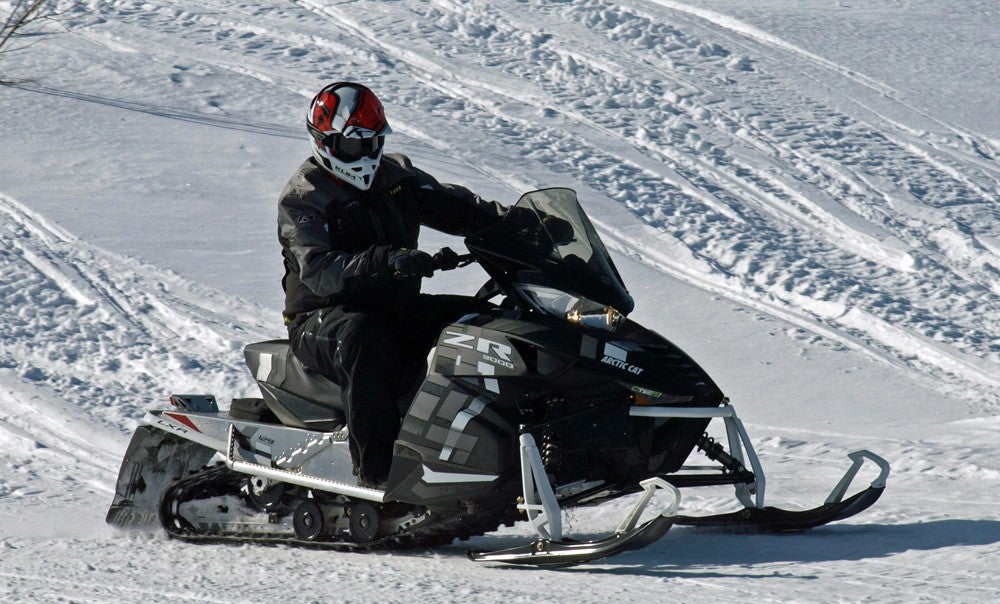
Cat’s value ZR 3000 LXR strikes a stylishly handsome pose on the snow and features good ergonomics, on-trail comfort and sport handling.
All three of these models are aimed at the more casual snowmobiler, the ones who may ride with family or a group of friends. These riders tend to be “club” riders, not trail burners. Comfort, mileage and price will be much more important than sheer top speed and acceleration. Still, these value-conscious owners demand handling and a sense of sport for their ride, which dictates modern technology such as electronic fuel injection, quiet four-stroke operation and dependable suspensions. These three sleds comply. They just do it a bit differently one to the other.
Al three are powered with four-stroke twins. The Yamaha, which has the most power at 80 hp, features the smallest displacement at 499cc. Ski-Doo’s Rotax-engineered ACE 600 is about 60 horsepower, 20 less than the Yamaha Phazer. But it offers the lightest throttle pull thanks to its Intelligent Throttle Control, Ski-Doo’s version of throttle by wire. It also allows you to literally flick a console-mounted switch to change to one of three computerized performance modes: Standard, Sport or ECO for maximum mileage. Rotate the throttle flipper on the handlebar and you can pull the lever with your finger instead of pushing it with your thumb.
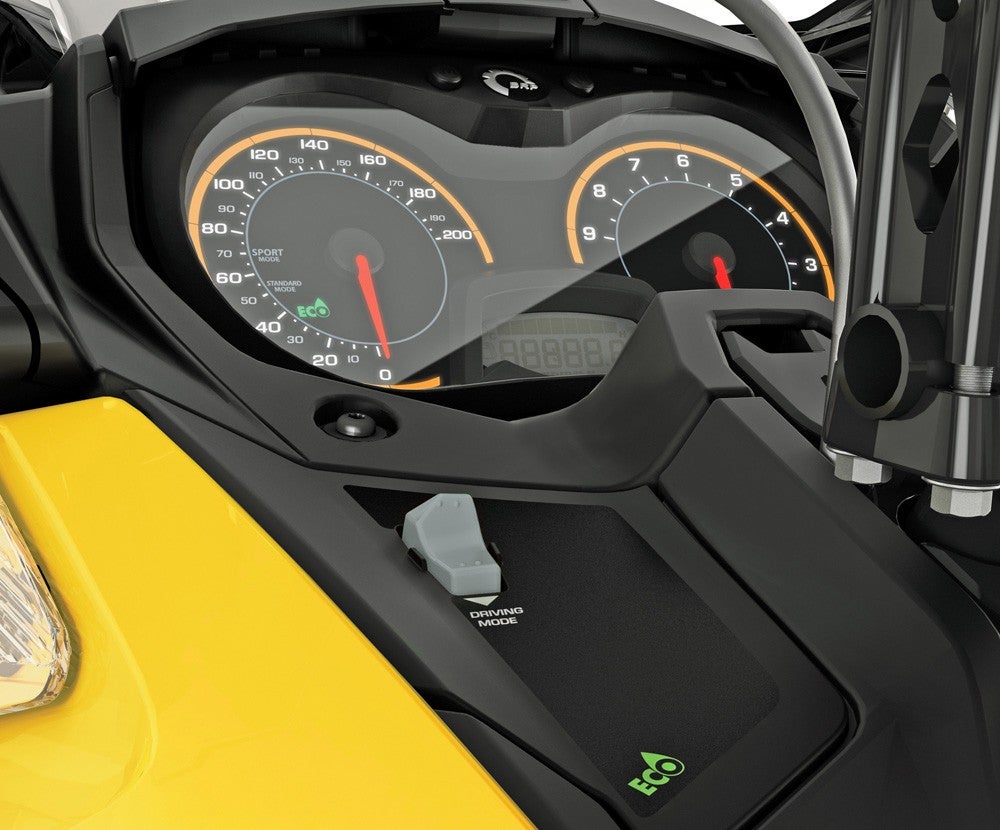
The Ski-Doo Sport ACE 600 allows you to easily switch into one of three computer-controlled performance modes: Standard, Sport and ECO for the best mileage.
The Phazer’s Yamaha Genesis 500 twin is based on serious high-performance 250cc race bike technologies, which means it is a high revving design that necessitated a gear reduction system to bring the revs down from 11,000 to a clutch-able 8700. The engine pulls about 80 horsepower between 10,700 and 11,300 revs and at 8700 rpm it delivers 62 lb-ft of torque. That’s more than enough to make it the sportiest of these three sleds.
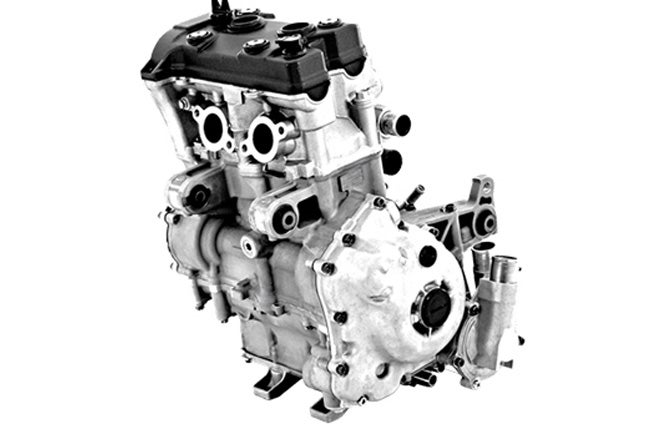
Based on high-performance Yamaha motocross designs, the Phazer R-TX is the smallest in displacement at 499cc but most powerful at 80hp.
Cat’s new for 2017 ZR 3000 LXR combines a proven ZR platform with a 3000 Series, 700cc four-stroke introduced last season to power select Bearcat and Pantera models. In this sport riding value model, the ZR 3000 uses proven Arctic Cat clutching to control the engine’s 60-plus horsepower. While Yamaha based its Phazer power on a high performance motorcycle engine, Arctic Cat’s engineers converted the Kymco-built unit used so successfully in its Wildcat Trail Side-by-Side. Although rated at about 65 horsepower, we’d pick the Cat ZR 3000 as the most trail-able of these three sleds. Its larger displacement seems to let it loaf along easier when trail riding in a group. But it’s still ready for a quick throttle hit when you want to push it. The Phazer twin never lets you forget its high revving nature, and the Ski-Doo ACE 600 just seems too rooted to economy.
They all perform well, but offer decidedly different character that may better suit one buyer over another. The Ski-Doo should easily win the mileage award. When combined with its snocross-oriented chassis, the Phazer would be our pick for play. But the Cat manages to crossover well between play, economy and casual trail riding.
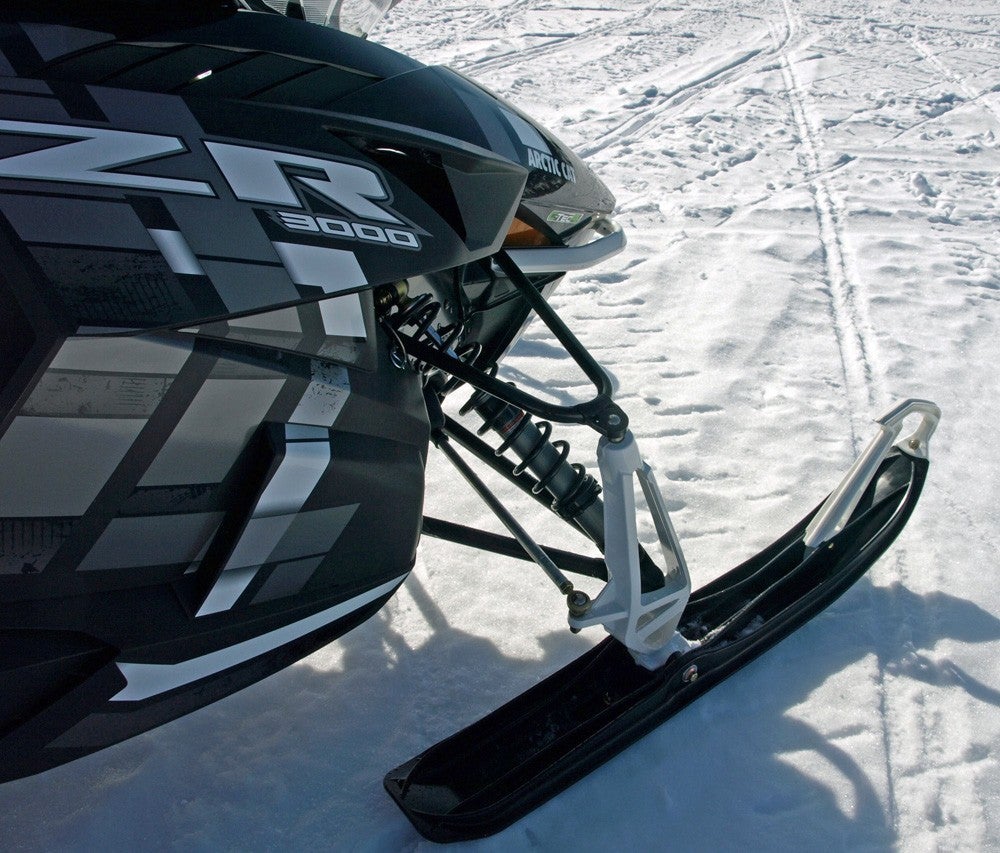
The value-priced Cat ZR 3000 LXR features the proven tall spindle Cat-engineered ARS front suspension.
The Phazer definitely lives up to its R-TX rating, which is Yamaha’s sportiest nomenclature for its performance models. There used to be a more relaxed version, the Phazer GT, but Yamaha settled on a singular trail model, keeping the RTX. This version comes with premium Fox Float Air shocks, which plays a role its higher pricing. If you are looking for a truly casual trail sled for club rides, we suggest you look closely at the Cat or Ski-Doo. The Phazer is definitely oriented toward performance. The YZ-style seat is narrow and sits high for a reason; it suggests a motocross bike. While it fits into the ride-forward world of modern sled-dom, the Phazer is designed to be more snocrosser than club ride. The windscreen is low. The handlebars are exposed. The suspensions are expected to utilize all of their travel: 8.6 inches at the skis and 16.2 at the rear. The sled feels lighter than it is and responds more quickly than the other two models – even Ski-Doo’s MXZ Sport.
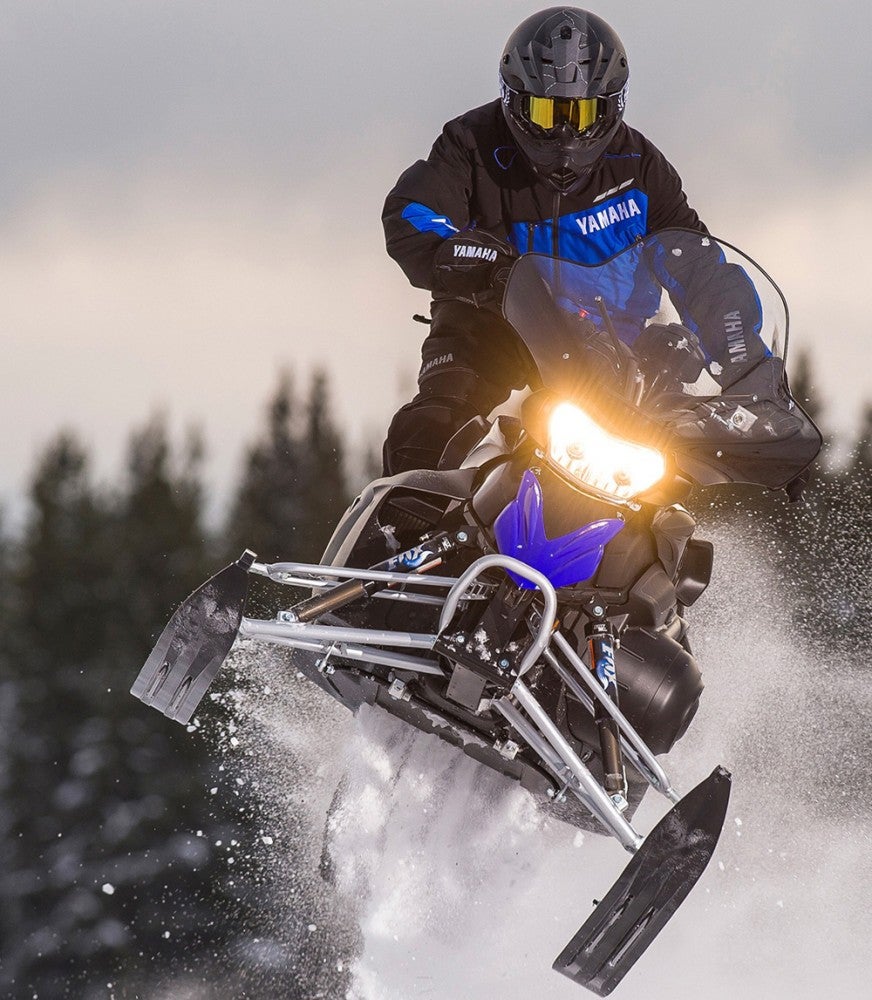
Of these three liquid-cooled value sport models, Yamaha’s Phazer is the one most ready for full-on sport riding as it was initially designed to be more of a play snocrosser than mile-making cruiser.
The Ski-Doo Sport with the ACE 600 is an excellent sled for casual club rides where the top speed is 45-plus miles per hour. This sled can economically run at that speed all day, all weekend long. While not an inspiring ride, the Sport ACE 600 is based on the REV XS platform and features newish suspensions. The SC-5 rear suspension is good, but not up to the newer rMotion standards. You really don’t need that degree of cushioning with the 60hp ACE.
You will find a good degree of sport thanks to the sled’s MXZ pedigree being built in to it. After all, this is the sled that started the ride-forward revolution. The sled handles well, corners ably and should give you definite bragging rights when you stop for fuel. It’s a mileage all-star and that’s without switching to ECO mode. The Sport ACE 600 is quiet and very stylish on the trail.
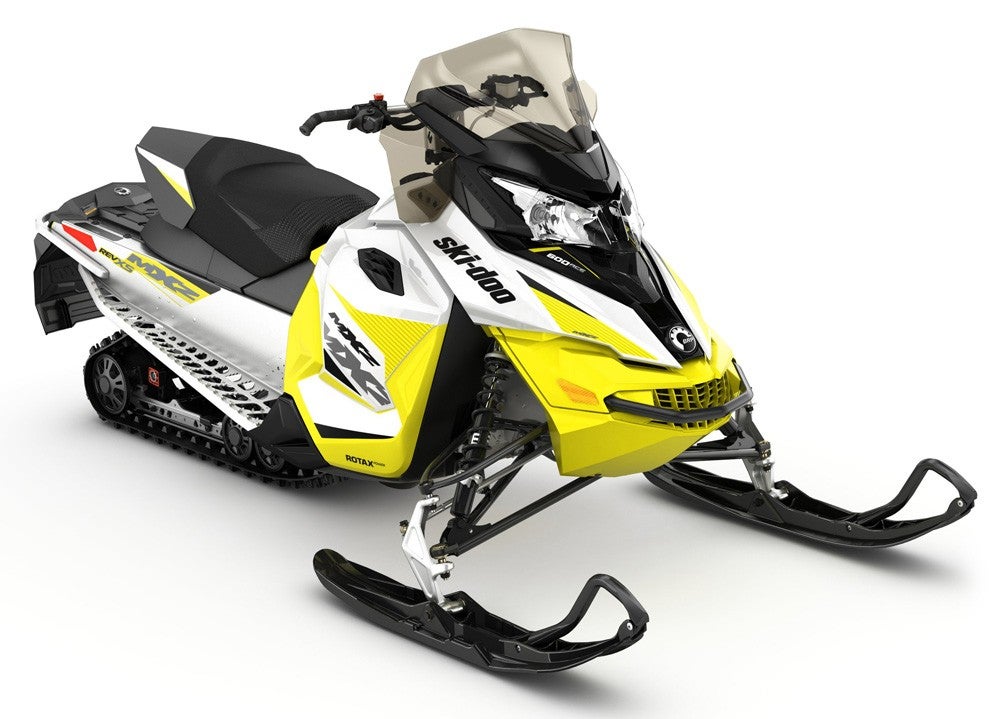
Modern value sleds look anything but inexpensive as Ski-Doo’s stylish MXZ Sport ACE 600 proudly displays its REV heritage of ride-forward sport handling.
Cat’s new ZR 3000 LXR takes full advantage of its ZR platform and suspension systems. The slide-action rear suspension works exceedingly well on a sled with this power output. It’s actually a bit of overkill for a sled with 65 horses, but hey, you’ll appreciate it. The tall spindle front end grips well and provides positive steering. You’ll gain the advantage of riding the sled with the longest track at 129 inches. The Ski-Doo track measures 120 inches but has the tallest lugs at 1.25 inches. The Yamaha track width is only 14 inches in width, versus a 15-inch width on the Cat and Ski-Doo. We felt the Cat ZR 3000 LXR’s longer track offers a trail riding advantage.
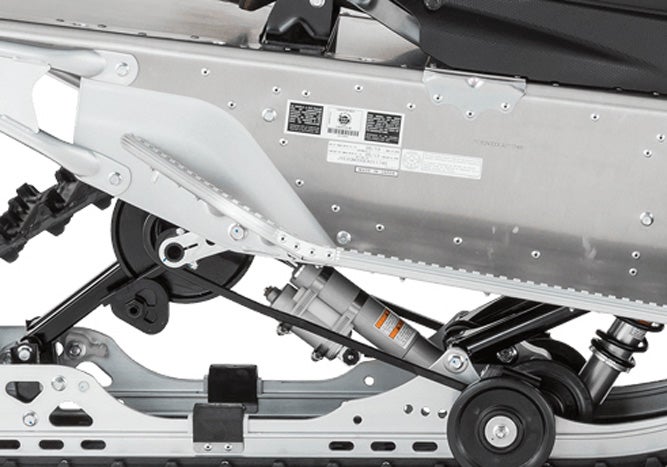
The Phazer’s YZ-style seat is narrow and sits high to mimic a motocross bike and help you maximize the performance of its Dual Shock CK rear suspension with its class-leading 16.2 inches of travel controlled via a 36mm aluminum HPG shock and clicker 40mm aluminum HPG piggyback shock.
All three of these models offer push button reverse gear selection and electric start. Their ergonomic layouts are similar, with the Phazer being more oriented for snocross action. The Cat and Ski-Doo are definitely the most comfortable for casual club rides. The Yamaha provides a racer feel that will appeal to younger, active riders.
While these sleds are not the fastest or quickest accelerating, they will probably be the longest lasting sleds you can buy for long term value.
| 2017 Arctic Cat ZR 3000 LXR | 2017 Ski-Doo MXZ Sport 600 ACE | 2017 Yamaha Phazer R-TX | |
| Engine | Arctic Cat/Kymco 3000-Series C-TEC4 700cc, liquid-cooled, 4-stroke twin; 76.9×75.3mm bore/stroke; electronic fuel injection | Rotax 600cc ACE 600; double overhead cam, liquid-cooled, 4-stroke twin; 74×69.7mm bore/stroke; electronic throttle body fuel injection; multi-mode intelligent throttle control (Sport, Standard, Eco settings); Learning key | Yamaha Genesis 499cc, liquid-cooled, 4-stroke twin; 77×53.6mm bore/stroke; 43mm Keihin electronic fuel injection |
| Horsepower | 65 (claimed) | 60 (claimed) @ 7250 rpm | 80 (claimed) @ 11,000 rpm (gear reduction to 8700 rpm at clutch) |
| Drive | Arctic 6-post rpm sensing drive with 10.75-inch Arctic roller cam driven | Ski-Doo/Rotax eDrive2 with QRS; 2200 rpm engagement | Yamaha YXRC drive/driven |
| Front Suspension | Arctic Race Suspension (ARS) with Arctic Cat IFP 1.5 internal floating piston coil-over-shocks; sway bar; 10 in maximum travel | Dual A-arm with Motion Control shocks with coil-over spring assist; 9 inches maximum travel; Pilot 5.7 skis | Yamaha double A-arm with Fox Float Air shocks; 8.6 in maximum travel; Yamaha Tuner II skis |
| Rear Suspension | Arctic Cat parallel rail Slide-Action suspension; coupling blocks; adjustable torsion springs; torque-sensing link rear arm; Arctic Cat IFP shocks; 13.5 inches of travel | Ski-Doo parallel rail SC-5 suspension; Motion Control shocks; 9.8 inches of travel | Yamaha Dual Shock CK rear suspension; 36mm aluminum HPG shock and 40mm aluminum HPG “clicker” piggyback shock; 16.2 in maximum travel |
| Length | 111.0 in | 114.4 in | 111.0 in |
| Height | 49.25 in | 47.6 in | 52.8 in |
| Width | 47.75 | 47.9 in | 47.8 in |
| Ski Stance | Adjustable 42-43 in with ProCross-6 ski | 42.4 in | 42.5 in |
| Track | 15 x 129 x 1.0 RipSaw II Track | 15 x 120 x 1.25 RipSaw Track | 14 x 121 x 1.0 Ripsaw |
| Weight | NA | 459 lbs | NA |
| Brake | Hydraulic disc brake | Brembo hydraulic disc brake | Hydraulic dual piston, ventilated disc brake |
| Features | Standard: electric start; push-button mechanical reverse; Power Sport gauge with digital tach & speed readout; 12-volt accessory outlet; sport front bumper; High Performance seat; 13-inch mid-height windshield; 5.5-inch riser; rear belt bag; dual halogen headlights Optional: passenger seat; skid plate; mirrors; gear and storage bags | Standard: electric start; push-button mechanical reverse; analog gauge with readout; REV-XP seat with storage; aluminum handlebar with “J” end hooks Optional: windshields; skid plate; mirrors; gear and storage bags | Standard: electric start; push-button mechanical reverse; LCD multi-function gauge with digital tach & speed readout; Yamaha YZ-style Performance seat Optional: mirrors; gear and storage bags |
| Fuel Capacity | 9.9 US Gal (87 octane) | 10.6 US Gal (87 octane) | 7.0 US Gal (87 octane) |
| MSRP | US$8,799 / CAD$11,499 | US$8,799 / CAD$10,199 | US$9,350 / CAD$10,299 |



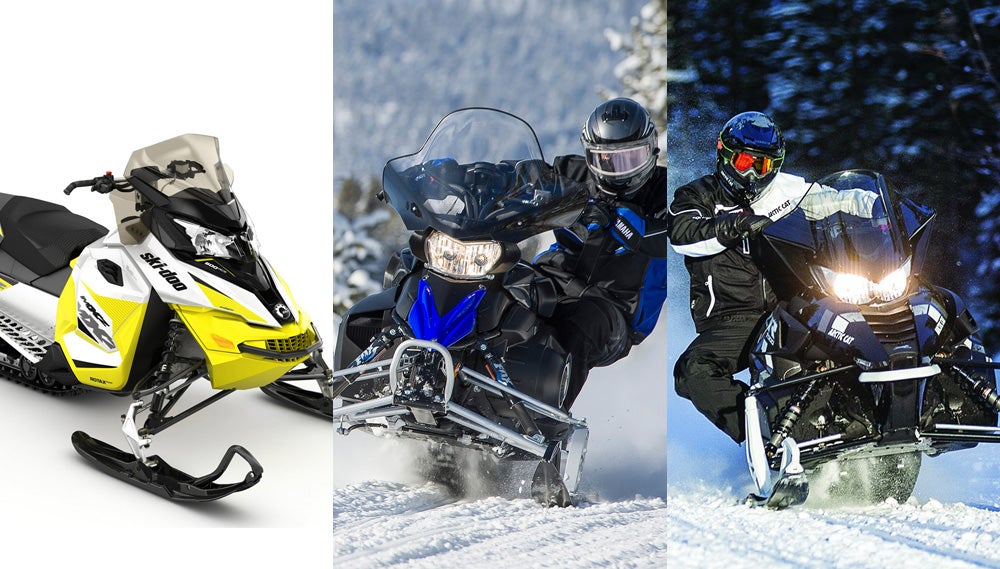
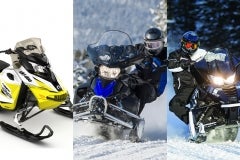
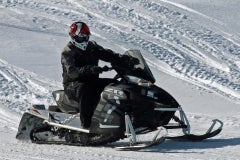
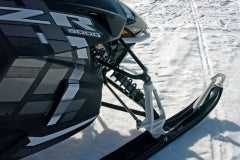
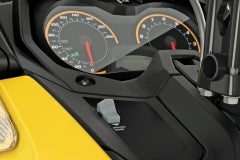
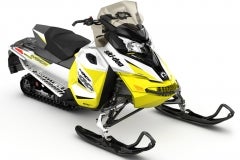
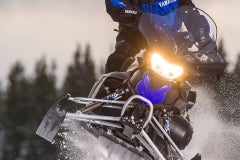
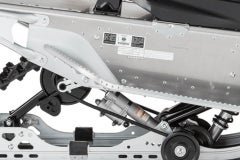
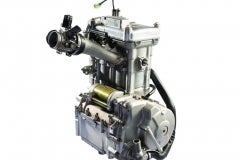
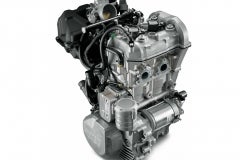
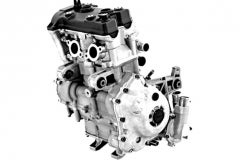
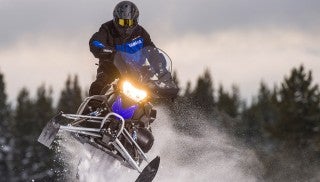




 Your Privacy Choices
Your Privacy Choices